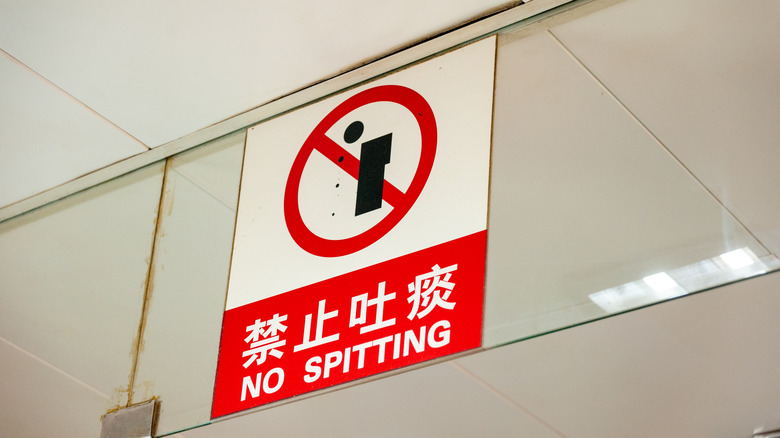The Common Habit That Could Get You Fined In This Popular European City
You're walking around the beautiful streets of Barcelona, admiring the fantastical Sagrada Família church. Unbeknownst to you, because of the transatlantic flight 12 hours prior, your immune system has been fighting something sickly. So, you naturally spit out some mucus on the pristine cobblestone of the city square. You feel better and walk on — except a police officer approaches you and hands you a ticket for 100 euros.
That's right, in Barcelona, spitting is illegal and punishable by fines. Other forms of uncivil behavior are also disallowed in the Spanish city, including urinating and littering in public spaces. Spanish law forbids anything that can tarnish a city's image, and not only in Barcelona. Cartagena, a port city 400 miles west of Barcelona, has similar laws. When caught in the act, a police report and disciplinary case gets filed, after which the offender has 10 days to plead guilty or not guilty. If the public defiler admits their wrongdoing, they will receive a 20% reduction on the fine.
It goes without saying that destructive and impolite behaviors are better left at home, especially when traveling abroad — simply out of sheer consideration for where you are and also to give your own country a better reputation in the eyes of the locals. A spitting fine, and the embarrassing story of how you got it, is not something you want to bring back with you from Barcelona. A lovely Catalan souvenir would be much better.
The cost of public spitting worldwide
One of the primary reasons behind the prohibition of public spitting is health concerns. Saliva can carry numerous pathogens, and spitting can contribute to the spread of contagious diseases. During times of global health crises, such as the flu or the COVID-19 pandemic, the act of spitting has even more severe implications. Thus, many cities that might not have penalized spitting before, took measures to ensure the act was discouraged.
Spain is not the only country taking a stance against public spitting. Countries like Singapore, known for its stringent cleanliness regulations, penalize public spitting with hefty fines. The first time you get caught spitting in Singapore, a S$1,000 ticket is issued — the second time, up to S$2,000. Spit again, and you're getting upwards of a S$5,000 fine. That's no spare change (S$5,000 is over $3,500 in U.S. dollars!). The same harshness goes for parts of India, South Africa, and Hong Kong — expect a penalty of HK$1,500 for public spitting in Hong Kong. The rationale behind these fines isn't just about maintaining street cleanliness; it's also about promoting a culture of respect and mutual consideration.
While spitting may not be broadly illegal in many parts of the United States, there are specific areas or circumstances where it's prohibited. For instance, spitting inside public transportation or indoor venues can result in penalties or getting kicked out. At the end of the day, it's all about respect — for the people around you, the environment, and your own favorable representation.
From taboo to tradition
Beyond the legal ramifications, it's essential to consider the cultural angle. In many societies, spitting is seen as not just unhygienic, but also rude or even considered criminal assault, especially when done on someone (intentionally or not). It's a sign of disrespect and can be particularly offensive in areas where cleanliness and purity are highly valued.
Conversely, in certain cultures, spitting has historically been seen as a way to ward off bad luck. This is common in Greece, Moldova, Israel, and Russia, where it is done to protect against the "evil eye." It is more of a symbolic and verbal spitting — not literally spitting on someone or something, which is considered taboo. However, with increasing globalization and the universal need to prevent the spread of diseases, many of these areas have also begun to frown upon or regulate public spitting.
Whether you're a seasoned traveler or someone who's just starting to explore the world, it's essential to be aware of local customs, regulations, and the cultural significance of your actions. Something as seemingly innocuous as spitting can have broader implications, both legally and socially. So, the next time you find yourself in Barcelona or another foreign city, remember: Keep that saliva in your mouth to save you from a hefty fine and ensure you're showing respect to the local culture and populace. As the proverb goes, "When in Rome, do as the Romans do." And, in many parts of the world, that means no spitting!


